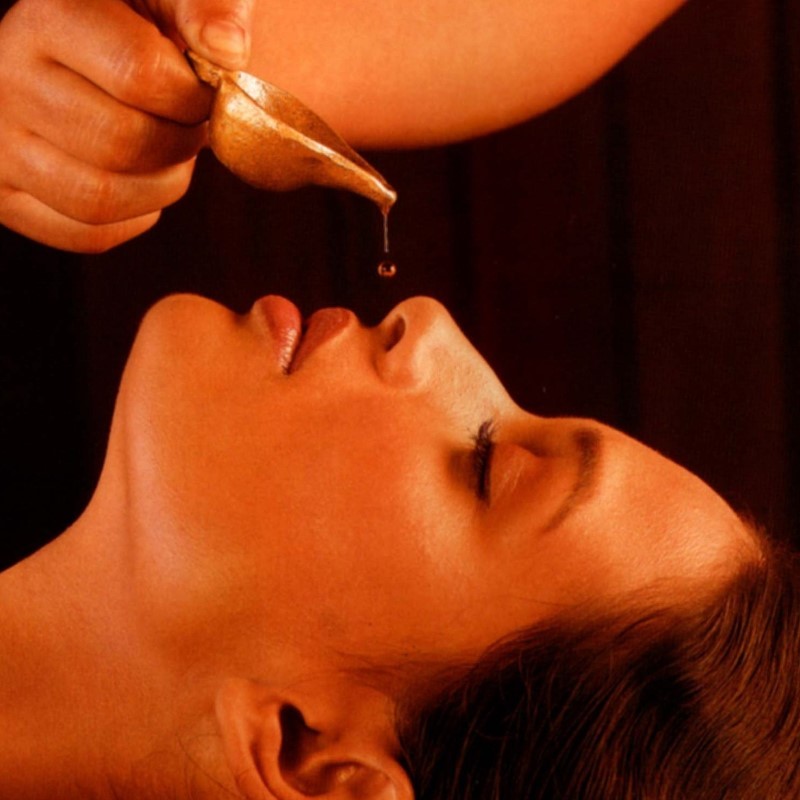Introduction
Sinusitis, referred to as “pinasa” in Ayurveda, is a condition characterized by inflammation or swelling of the sinuses’ lining, resulting in a range of discomforting symptoms. Normally filled with air, the sinuses can become obstructed and collect fluid, providing a breeding ground for harmful germs. Ayurveda offers holistic approaches to manage and alleviate sinusitis, and Raha Ayurveda Hospital specializes in providing Ayurvedic treatment for sinusitis offering relief through personalized Ayurveda therapies. In this blog, we will delve into the various types, symptoms, causes, and Ayurvedic management of sinusitis.

Types of Sinusitis
1. Acute sinusitis: Typically caused by bacterial or viral infections, this condition lasts for approximately four weeks.
2. Subacute sinusitis: Usually resulting from bacterial infections, this condition persists for four to twelve weeks.
3. Chronic sinusitis: An infection brought about by bacteria, fungi, or viruses that lasts for twelve weeks or more.
4. Recurrent sinusitis: Occurs multiple times a year, often due to structural issues or underlying medical conditions.
5. Allergic sinusitis: Arises from allergies, leading to sinus inflammation triggered by allergic reactions.
Symptoms of Sinusitis

The symptoms of sinusitis vary depending on its type and severity. Common symptoms include:
- Nasal congestion or a stuffy nose
- Thick, discolored mucus in the nose or throat
- Facial pain or pressure
- Headaches
- Toothaches
- Loss of smell or taste
- Fatigue
- Cough
- Sore throat
- Halitosis (bad breath)
- Fever
- Ear pain
- Nausea
Causes of Sinusitis
Sinusitis often stems from various causes, including:
1. Infections: Viruses, bacteria, and fungi are common culprits behind sinusitis, particularly in cases of acute or chronic sinusitis.
2. Allergies: Allergic reactions to substances like pollen, dust mites, or animal dander can lead to sinus inflammation.
3. Nasal polyps: Small growths in the nasal lining can obstruct the sinuses. Deviated septum: A shift in the nasal cavity can result in blockages and contribute to sinusitis.
4. Dental infections: Infections in the teeth or gums can spread to the sinuses, causing inflammation.
5. Environmental factors: Exposure to irritants such as air pollution or cigarette smoke can trigger sinusitis.
6. Immune system disorders: Conditions that weaken the immune system elevate the risk of sinusitis.
Ayurvedic Management of Sinusitis
Ayurveda identifies an imbalance of kapha and vata doshas above the collarbone as the root cause of acute sinusitis. To address this, Ayurvedic treatments focus on detoxification through panchakarma, external therapies, internal medications, dietary adjustments, and lifestyle modifications. A key therapy for sinusitis is Nasya, which involves the application of medicated oils or powders through the nasal passages.
Nasya
Nasya is highly effective for sinusitis as it lubricates and cleanses the nasal passages, reduces inflammation, and clears blockages. The procedure involves reclining with your head slightly tilted back as medicated oil or powder is gently instilled into each nostril. Subsequently, a gentle massage aids in the even distribution of the medicine. Ayurvedic Nasya treatment can be administered as a standalone therapy or as part of a comprehensive Ayurvedic treatment plan. Unlike antibiotics or decongestants, it offers safe and natural relief from congestion, headaches, and facial pain.

Preventing Recurrence -Nasya therapy also serves to prevent the recurrence of sinusitis by enhancing the health of the nasal passages. Yoga and meditation play a pivotal role in Ayurvedic treatment plans, addressing underlying imbalances, alongside lifestyle alterations and dietary recommendations. In Ayurveda, healing is a holistic process aimed at averting sinusitis and promoting long-term health.
Dietary Modifications
Ayurveda emphasizes a diet that is tailored to an individual’s constitution, or Prakriti. Those with sinusitis have to reduce dairy, sugar, and cold, heavy foods while incorporating warm, light, and easily digestible meals. Spices like turmeric and ginger are known for their anti-inflammatory properties and can be used to alleviate symptoms.
Herbal Remedies
Ayurvedic practitioners often recommend herbal preparations like Trikatu (a combination of ginger, black pepper, and long pepper) to reduce congestion and inflammation. Nasya, a therapy involving the application of medicated oils or herbal solutions into the nasal passages, helps to relieve sinus congestion and promote drainage.
Lifestyle Changes
Ayurveda places a strong emphasis on maintaining a healthy lifestyle. Practices such as daily nasal cleansing with a neti pot, regular exercise, stress management, and adequate sleep can contribute to the prevention and management of sinusitis.
Sinusitis Management at Raha Ayurveda Hospital
Raha Ayurveda Hospital adopts a holistic approach to sinusitis treatment, incorporating Ayurveda, yoga, and meditation. Their adept practitioners craft personalized treatment plans designed to target the root causes of sinusitis. This healing experience is enriched by the serene natural surroundings and nutritious meals. If you seek relief from sinusitis and overall wellness, consider booking a stay at Raha Ayurveda Hospital.
Integrated Functional Medicine Approach
Integrated functional medicine combines conventional Western medicine with complementary and alternative therapies, including Ayurveda, to provide a comprehensive treatment approach for sinusitis.
1. Identifying Underlying Causes: Integrated functional medicine seeks to identify and address the root causes of sinusitis. This may involve comprehensive testing to uncover allergies, immune system deficiencies, or chronic inflammatory conditions that contribute to sinus issues.
2. Nutritional Support: Nutritional supplements, such as antioxidants, omega 3 fatty acids, which have anti-inflammatory properties, may be recommended to reduce inflammation in the sinuses. Additionally, a personalized diet plan can help minimize food triggers that worsen sinusitis symptoms.
3. Mind-Body Practices: Stress is known to exacerbate sinusitis symptoms. Techniques such as yoga, meditation, and mindfulness can help manage stress and improve overall well-being, potentially reducing the frequency and severity of sinusitis flare-ups.
4. Environmental Modifications: Identifying and addressing environmental factors that contribute to sinusitis, such as exposure to allergens or pollutants, is a key component of integrated functional medicine.
Conclusion
Sinusitis can be an enduring and uncomfortable condition, but Ayurveda offers effective and holistic methods to manage and prevent it. With therapies such as Nasya and a focus on dosha balance, Ayurvedic management of sinusitis endures relief while fostering overall health and well-being. Do not let sinusitis hinder you any longer; discover the transformative potential of Ayurveda at Raha Ayurveda Hospital today!

Leave a Reply